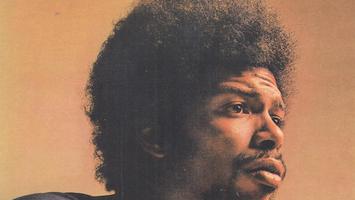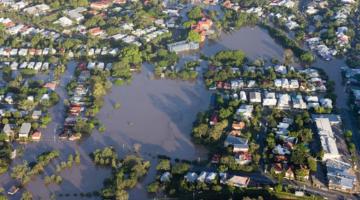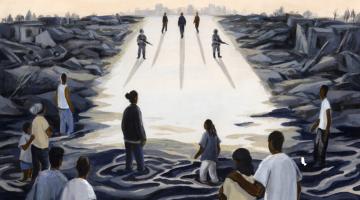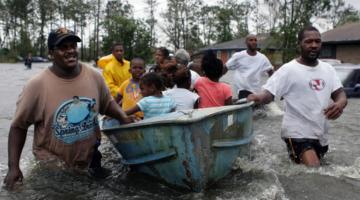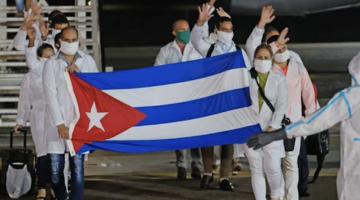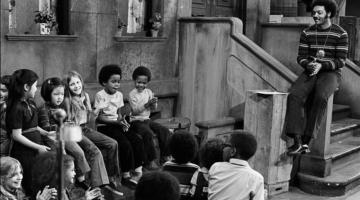Residents wait on a rooftop to be rescued from the floodwaters of Hurricane Katrina (David J. Phillip / AP)
Twenty years ago, the world witnessed more than the suffering of hurricane Katrina's victims. The United States was exposed as a failed state controlled by the cruelties of racialized capitalism.
“In 2005 the ruling elites were overjoyed because nature gave them the chance to do what they could not get away with easily. Overnight, New Orleans lost a huge portion of its poor, black population.” - “Katrina in the White Imagination” Black Agenda Report
Hurricane Katrina first struck the United States on August 25, 2025 making landfall in Florida as a Category 1 hurricane, the least powerful storm in that designation. But after being downgraded to the category of tropical storm, it gained strength as it traveled into the Gulf of Mexico and again reached hurricane status, making landfall again in Mississippi and Louisiana on August 29, 2025.
Residents of Mobile, Alabama, Gulfport and Biloxi, Mississippi, and New Orleans and other Louisiana cities were all devastated by the storm surge. Twenty years later when we think of Katrina it is the images from New Orleans, where large portions of the city are below sea level, which come to mind. Those who were unable to evacuate were stranded and the levees which were constructed to protect New Orleans were either topped by the storm surge or gave way altogether. The Lower Ninth Ward, home to a majority Black population, was flooded. The official number of deaths caused by hurricane Katrina was 1,392 people, mostly in Louisiana and Mississippi, but also in Alabama and Florida.
Black Agenda Report was founded in 2006, one year after the disaster took place. But our contributors had much to say about hurricane Katrina before and after this site came into being. We remember seeing Black people wading through waist deep water, being demonized even as they took shelter in the Superdome where they were falsely accused of abusing children. People fired gunshots into the air in an effort to get the attention of rescue helicopters only to be accused of deliberately shooting at them. The corporate media reported that white people found food while Black people in identical circumstances were said to be looters.
No one can forget George W. Bush as he praised Michael Brown, Director of the Federal Emergency Management Agency (FEMA), with these words. “Brownie, you’re doing a heckuva of a job.” The Bush administration was widely condemned for inaction and incompetence as they failed to provide for the most basic needs of Gulf Coast residents. Michael Brown resigned his position two weeks later after it was revealed that he was brought to FEMA first as Assistant Director and then Director by his predecessor who was an old friend from his college days. Brown was an attorney whose previous position was at the International Arabian Horse Association, a position from which he was fired. He had no experience in disaster management. The lame duck Bush administration was caught flat footed and proved for all the world to see that the U.S. was a failed state, lacking the most rudimentary ability to help its citizens during a natural disaster.
The aftermath of the storm was not much better. Residents of Mississippi were housed in trailers which were tainted with high levels of formaldehyde and other toxins. New Orleans residents were told to stay where they had sought refuge and never return. The Black population did decrease and the white population increased after gentrification accelerated after the storm.
The Barack Obama administration wasn’t much better, as Secretary of Education Arne Duncan said publicly. “I think the best thing that happened to the education system in New Orleans was Hurricane Katrina.” Duncan was happy because the New Orleans public school system was done away with in favor of an all charter school system. Privatized education was Duncan’s fantasy, and if a killer storm got that job done, so be it.
Duncan was not alone. Ten years after Katrina struck, a columnist for the Chicago Tribune mused, “Envy isn’t a rational response to the upcoming 10-year anniversary of Hurricane Katrina.” Kristen McQueary added in her column entitled, In Chicago wishing for a hurricane Katrina. “. . . I find myself wishing for a storm in Chicago — an unpredictable, haughty, devastating swirl of fury. A dramatic levee break. Geysers bursting through manhole covers. A sleeping city, forced onto the rooftops.” Like Duncan, McQueary was happy to see neo-liberal dreams come true, even if hundreds of deaths were needed to fulfill her sick dream.
Disasters bring out the best and the worst in humanity and many in white America felt free to demonize and to exult during a human catastrophe that brought about what they wanted most, a big city which lost its Black population and that was then undone by disaster capitalism. Of course, others feared that the Black masses would leave and encroach upon spaces they claimed as their own. Barbara Bush, the mother of president George W. Bush, couldn't resist the temptation to spew a racist narrative about New Orleans residents who were being housed in Houston. “What I'm hearing, which is sort of scary, is they all want to stay in Texas. Everyone is so overwhelmed by the hospitality. And so many of the people in the arena here, you know, were underprivileged anyway so this is working very well for them." The blatant dehumanization of Black people, despised if they stayed or if they left, was the once quiet part now being said out loud.
For all of these reasons we give special attention to hurricane Katrina in this issue of Black Agenda Report. We remember our late co-founders and comrades Glen Ford and Bruce Dixon as they delved into the racist arguments in favor of Black dislocation and the people who saved themselves after supposedly charitable organizations such as the Red Cross showed themselves to be fundraising juggernauts who did nothing to help people in distress. We report on Mississippi, which received much less attention than New Orleans despite the fact that people there suffered just as much. Our poet-in-residence provides a searing indictment as only he can. We see connections with the history of New Orleans and imperialism as practiced to this very day.
No one should ever forget the lives ended and upended by hurricane Katrina. Their stories say so much about racialized capitalism, which has only been perfected in the last twenty years.
Margaret Kimberley is the author of Prejudential: Black America and the Presidents. You can support her work on Patreon and also find it on the Twitter, Bluesky, and Telegram platforms. She can be reached via email at margaret.kimberley@blackagendareport.com.




